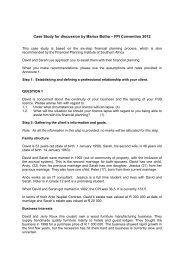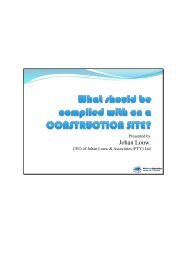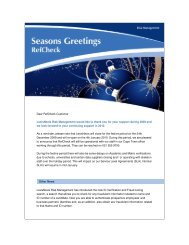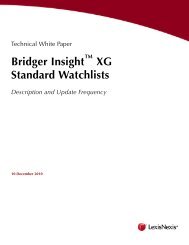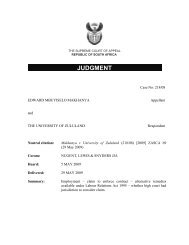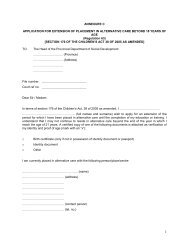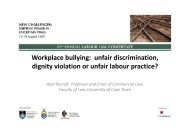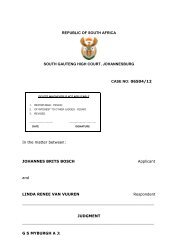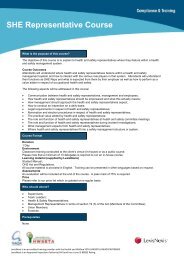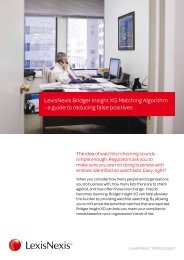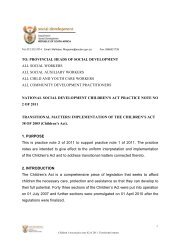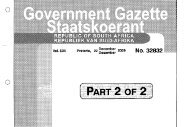Mogothle v Premier of the Northwest Province and others
Mogothle v Premier of the Northwest Province and others
Mogothle v Premier of the Northwest Province and others
You also want an ePaper? Increase the reach of your titles
YUMPU automatically turns print PDFs into web optimized ePapers that Google loves.
MOGOTHLE v PREMIER OF THE NORTH WEST PROVINCE & ANOTHERVAN NIEKERK J [2009] 4 BLLR 331 (LC) 343course under that statute had not been invoked. That distinguishes <strong>the</strong>case from <strong>the</strong> present, where <strong>the</strong> applicant disavows any reliance on <strong>the</strong>LRA. Secondly, on <strong>the</strong> facts <strong>of</strong> Koka, <strong>the</strong> applicant had been invited to aformal hearing to appear to give reasons why he should not be suspendedin circumstances where <strong>the</strong> reasons for <strong>the</strong> proposed suspension had beendisclosed to him. The notice <strong>of</strong> suspension was issued only after <strong>the</strong> hearing,at which <strong>the</strong> applicant had been given <strong>the</strong> fullest opportunity to contestboth <strong>the</strong> allegations made against him <strong>and</strong> <strong>the</strong> reasons pr<strong>of</strong>fered byhis employer for <strong>the</strong> proposed suspension, <strong>and</strong> to provide substantial informationabout his personal circumstances <strong>and</strong> <strong>the</strong> impact that any suspensionmight have on those circumstances. Thirdly, <strong>the</strong> Koka judgment,supra, to <strong>the</strong> extent that it holds that <strong>the</strong>re is no right to be heard prior to asuspension in <strong>the</strong> form <strong>of</strong> a “holding operation” (at 1029G–H, where <strong>the</strong>court refers to Dickson v Commonwealth 1992 55 CLR 34 at 44) 7 is atodds with <strong>the</strong> decision <strong>of</strong> <strong>the</strong> Cape Provincial Division <strong>of</strong> <strong>the</strong> High Courtin Muller v Chairman, Ministers’ Council, House <strong>of</strong> Representatives(1991) 12 ILJ 761 (C).[34] The second (<strong>and</strong> preferred) approach to procedural fairness is reflected inMuller, supra, where <strong>the</strong> court granted an urgent application in which <strong>the</strong>applicants, <strong>of</strong>ficers in <strong>the</strong> public service, sought an urgent review <strong>of</strong> <strong>the</strong>irsuspension pending disciplinary action. Although <strong>the</strong> remedy sought wasadministrative in nature, <strong>the</strong> judgment delivered by <strong>the</strong> court (Howie J, ashe <strong>the</strong>n was, with Nel J concurring) is a masterful review <strong>of</strong> domestic <strong>and</strong>comparative authorities on <strong>the</strong> application <strong>of</strong> <strong>the</strong> audi alteram partemprinciple in <strong>the</strong> context <strong>of</strong> <strong>the</strong> suspension <strong>of</strong> public sector employees. Thecourt rejected <strong>the</strong> approach represented by <strong>the</strong> Lewis judgment, <strong>and</strong>adopted instead <strong>the</strong> approach <strong>of</strong> Dixon v Commonwealth (1981) 55 FLR34; Schmohl v Commonwealth 1983 ACTR 24; <strong>and</strong> Birss v Secretary <strong>of</strong>Justice (1984) 1 NZLR 513, refusing to follow Jacobs & <strong>and</strong>ere v Ministervan Justisie & <strong>and</strong>ere (unreported case) <strong>and</strong> Swart & o<strong>the</strong>rs v Minister<strong>of</strong> Education & Culture, House <strong>of</strong> Representatives & ano<strong>the</strong>r 1986 (3) SA331 (C), both <strong>of</strong> which had previously held that <strong>the</strong> audi rule did not applyin <strong>the</strong> case <strong>of</strong> suspensions effected in terms <strong>of</strong> <strong>the</strong> relevant legislation.In Muller, <strong>the</strong> court concluded that <strong>the</strong> interests <strong>of</strong> fairness dem<strong>and</strong>ed ahearing before suspension, <strong>and</strong> noted <strong>the</strong> “startling unfairness” withwhich <strong>the</strong> denial <strong>of</strong> that right could operate (at 524F). 8[35] Although, as Mr Pretorius submitted, <strong>the</strong> Muller case was concerned with<strong>the</strong> application <strong>of</strong> <strong>the</strong> audi rule to a suspension in a statutory context <strong>and</strong>in circumstances where <strong>the</strong> employees concerned had been suspendedABCDEFGH________________________7 The case is incorrectly cited. The citation reflected in <strong>the</strong> Muller judgment is Dixon v Commonwealth(1981) 55 FLR 34 (see <strong>the</strong> Muller judgment at 773E). More fundamentally, though,<strong>the</strong> Dixon judgment does not support <strong>the</strong> proposition that suspension, as a holding operationdoes not require <strong>the</strong> employee to be heard. On <strong>the</strong> contrary, <strong>the</strong> court in that case held that atwo-fold decision to suspend <strong>and</strong> to withhold remuneration was invalid, because <strong>of</strong> <strong>the</strong> employer’sfailure to comply with <strong>the</strong> audi alteram partem principle.8 Muller has been followed in a number <strong>of</strong> cases – see, for example, Mhlauli v Minister <strong>of</strong>Department <strong>of</strong> Home Affairs & o<strong>the</strong>rs NNO (1992) 13 ILJ 1146 (SE) [also reported at [1992] 2All SA 177 (SE) – Ed].IJ



